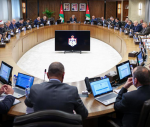You are here
Crafting Jordan’s role in a transforming regional landscape
Apr 27,2025 - Last updated at Apr 27,2025
Ahead of US President Donald Trump’s anticipated visit to Saudi Arabia, the UAE and Qatar, efforts are intensifying to prepare the ground for the “regional peace” agenda he seeks to make the central theme of his upcoming trip. In this context, there is growing talk of a Saudi desire to arrange a meeting in Riyadh between Syrian President Ahmad al-Shara’ and the American President. Regardless of the likelihood of such a meeting materialising, developments on the Syrian front suggest tactical and pragmatic steps within a broader repositioning strategy pursued by the new Syrian regime, aiming to open a path for reintegration with the West.
The messages Al Shara’ is sending go beyond internal processes. They align with a strategy of seeking US acceptance by dissociating Syrian territory from the Israel conflict equation, barring Palestinian factions from operating on Syrian soil and expressing the regime’s interest in joining the Abraham Accords — all in line with Washington’s ambition to redraw the map of “regional peace.”
Against this unprecedented and shifting regional backdrop, the urgency of redefining Jordan’s role becomes even more pressing. Jordan’s ability to craft a new, balanced and proactive regional role is among the most vital factors for safeguarding its stability and securing its national interests. It also elevates its standing in the eyes of its allies, particularly the United States.
Jordan’s security cooperation remains a pillar of strength and can be leveraged to expand its political influence. However, this must be coupled with a flexible and open foreign policy rooted in the principle of “the power of diplomacy,” rather than security considerations alone.
Looking ahead, Jordan must embrace a deeper role, not reactive, but initiative-driven, positioning itself as a regional mediator in the most sensitive and complex regional issues, including Syria, Iraq, and Lebanon. These are intricately tied to Jordan’s strategic depth, whether in terms of security, geopolitical and social extensions, or even water and economic security. Here, Jordanian diplomacy is called upon to actively shape solutions and regional understandings, not merely observe or play symbolic mediator.
Yet, this external role cannot be effective unless built upon strong internal foundations. Hence the importance of addressing domestic challenges within a clear national project, one that fosters deeply rooted notions of identity and belonging.
In this context, the decision to ban the Muslim Brotherhood and prohibit its activities marks a turning point in the relationship between the state and the organization. While this relationship has been tense over many years and reached critical peaks at various times, the recent move represents a qualitatively different approach — even compared to the turbulent days of the so-called “Arab Spring,” when the Brotherhood’s political ambitions surged.
This time, Jordan’s decision goes beyond the security dimension, despite the obvious security motivations. The Brotherhood’s future is now uncertain — whether in terms of mobility, economic and social networks, or even its traditional political activities.
However, the real challenge lies not in the decision itself, but in what follows. Jordan’s approach to the Brotherhood must not remain confined to security. What is needed is a comprehensive national strategy that reshapes the intellectual and cultural landscape, addresses the roots of extremism and strengthens the values of enlightenment, belonging, and citizenship.
In other words, Jordan needs a long-term national renaissance project — one that offers intellectual and moral alternatives and restores the role of culture, education, and public discourse, all within a redefinition of national identity, not merely tighter security control.
Today, Jordan faces a rare opportunity to create a meaningful and influential regional role, while also reorganizing its internal front on firmer, more sustainable foundations. This demands vision, will, and swift action that goes beyond mere “responses to pressure” toward a mindset of “proactive initiative.”














Add new comment